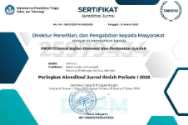Ahdi, A., & Firmansyah, H. (2021). Buy and Selling in the Perspective of Jahiliyah and Islam a Comparison Study a Review of Sharia Economic History. International Journal of Nusantara Islam, 8(2), 264–273. https://doi.org/10.15575/ijni.v8i2.11987
Aidid, M. A. (2024). The Transformation of Interest Prohibition : A Comparative Study of Riba ( Usury ) in Contemporary Financial Systems The development of the global market , particularly in the context of modern. 6(2), 113–127. https://doi.org/10.24252/mazahibuna.vi.44469
Berutu, A. G. (2020). Pump and Down in Jiwasraya Investation and the Absence of Islamic Economy Law Principles. Jurisdictie: Jurnal Hukum Dan Syariah, 11(2), 328–351. https://doi.org/10.18860/j.v11i2.8624
Bin, F., Rahman, A., & Yahya, A. (2021). Faith-based Characteristics of Financial Behavior in Islam As derived from the Holy Qur ’ an and Prophetic Tradition ( Al-Khasa ’ is al-Imaniyyah lis-Suluk al- Mali fil Islam fil Qur ’ an ... ( Al- Khasa ’ is al -Imaniyyah lis-Suluk al-Mali fil Islam. December.
Enang Hidayat, & Abu Umar Faruq Ahmad. (2023). Legal Maxims of Ba’i Ibn Al-Arabi’s Contract and Their Relevance to Contemporary Muamalah Maliah Issues. Jurnal Hukum Islam, 21(1), 1–28. https://doi.org/10.28918/jhi_v21i1_01
Farikhin, A., & Mulyasari, H. (2022). Gharar, Fraud and Dispute in Islamic Business Transaction an Islamic Law Perspectives. International Economic and Finance Review, 1(2), 40–53. https://doi.org/10.56897/iefr.v1i2.18
Gunariah, F., Al Hakim, S., Jubaedah, D., Apriani, T., & Fadhlya Hidayatunnisa, N. (2024). Perbandingan Fikih Tentang Gharar. Rayah Al-Islam, 8(1), 161–174. https://doi.org/10.37274/rais.v8i1.922
Irfanudin, F. (2023). A Critical Study of Contracts in the Perspective of Fiqh Mu’amalah (Overview of Contract Defects). Jurnal Ilmiah Ekonomi Islam, 9(01), 1015–1022. http://dx.doi.org/10.29040/jiei.v9i1.7605DOI:http://dx.doi.org/10.29040/jiei.v9i1.7605
Islamic Banking and Interest_ A Study of the Prohibition of Riba and Its . (n.d.).
Lisa, H. (2024). Kerangka Etika Ekonomi Bisnis; Riba dan Gharar. Al-Zayn: Jurnal Ilmu Sosial & Hukum, 2(2), 82–91. https://doi.org/10.61104/alz.v2i2.327
Margono, Prayoga, & Ochii. (2022). Sharia Investment In Order To Enforcement Sharia Principles. Jurnal Ekonomi Syariah, 1(1), 3. https://jurnal.pptq-annaafi.org/index.php/jeksyar/article/view/2
Mawardi. (2018). Konsep Khiyar Ghabn Dalam Perspektif Mazhab Hanafi Dan Hambali Dalam Transaksi Bisnis Modern.
Muhammad Syarifati, B., & Panorama, M. (2022). Maysir Element Analysis in Binary Option Platform Case Study of Iq Option Application. Indonesian Journal of Multidisciplinary Science, 1(10), 1202–1210. https://doi.org/10.55324/ijoms.v1i10.182
Muhammad, U. (2021). AN ANALYTICAL STUDY ON THE “TADLEES” OF IMAM ZAHRI. 5(4), 828–835.
Mukri, S. G., Arif, S., Sutisna, Yono, & Fauzi, A. S. (2019). Transaksi Jual Beli Terlarang Ghisy atau Tadlis Kuantitas. 1(2), 145.
Nafsi, S. U., Islam, U., Banda, N. A., Fahmi, C., Islam, U., Banda, N. A., Sholihin, R., Islam, U., & Banda, N. A. (2024). ANALISIS KEABSAHAN PRAKTIK LELANG BARANG BEKAS PADA MEDIA SOSIAL FACEBOOK : SUATU KAJIAN DARI. 8(2), 622–643.
Ridwan, M., AM, S., Ulum, B., & Muhammad, F. (2021). Pentingnya Penerapan Literature Review pada Penelitian Ilmiah. Jurnal Masohi, 2(1), 42. https://doi.org/10.36339/jmas.v2i1.427
Rijalul Fikri, A. L. (2021). Qawā’id Al-Fiqhiyyah Analysis on The Prohibition of Monopoly Practices and Unfair Business Competition: A Critical Review. Justicia Islamica, 18(1), 132–148. https://doi.org/10.21154/justicia.v18i1.2466
Rustriningsih, & Fejrian Yazdajird Iwanebel. (2024). Revisiting the Prohibition of Khamr and Maysir in the Qur’an: An Examination of Surah Al-Mā’idah [5]: 90-91. REVELATIA Jurnal Ilmu Al-Qur`an Dan Tafsir, 5(1), 1–18. https://doi.org/10.19105/revelatia.v5i1.13294
Shohih, H., & Setyowati, R. (2021). Perspektif Hukum Islam Mengenai Praktik Gharar Dalam Transaksi Perbankan Syariah. Dialogia Iuridica: Jurnal Hukum Bisnis Dan Investasi, 12(2), 69–82. https://doi.org/10.28932/di.v12i2.3323
Umar, Z., Seruni, P. M., Falah, M., Krismen, Y. (2024). SYARIAH STOCKS: A NORMATIVE ANALYSIS OF ISLAMIC LAW AND INVESTMENT PRACTICES IN INDONESIA Zulkarnaini Umar 1 , Puti Mayang Seruni 2 , Muhammad Falah 3 , Yudi Krismen 4. 06(2), 317–336.
 (Universitas Nahdlatul Ulama Sunan Giri Bojonegoro)
(Universitas Nahdlatul Ulama Sunan Giri Bojonegoro) 




.jpg)



